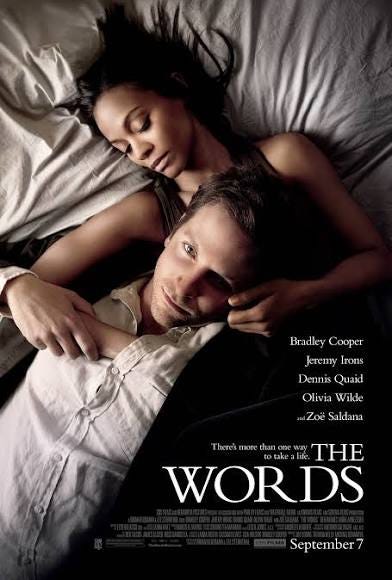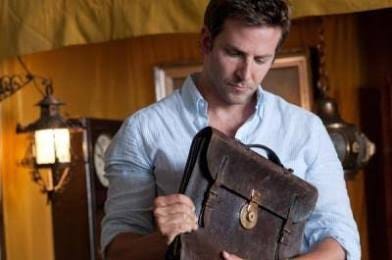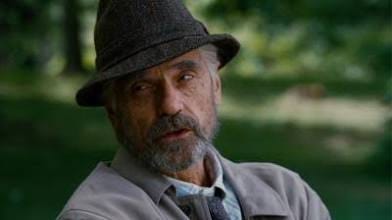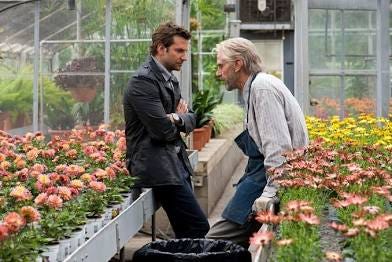“The Words” (2012)
A Review With a Wink
Ah, The Words. That literary, layered, meta little film starring Bradley Cooper, Jeremy Irons, Zoe Saldana, Dennis Quaid, and Olivia Wilde—a film that really wanted to talk about writing but ended up being more about talking about writing. It’s the cinematic equivalent of someone telling you about a great novel they’re thinking of writing while sipping an overpriced coffee at a Brooklyn café. And yet… I loved it. Sort of. Maybe. I think?
Let’s unpack.
The Story (Or Is It? Or Is It About the Story? Or the Story Within the Story?)
At its core—assuming it has a core—The Words is a nesting doll of narratives:
1. Layer One: Dennis Quaid plays an author (Clay Hammond) reading from his new novel at a literary event.
2. Layer Two: The novel he’s reading is about Rory Jansen (Bradley Cooper), a struggling writer who finds an old manuscript in a vintage satchel, publishes it as his own, and becomes wildly successful.
3. Layer Three: An old man (Jeremy Irons, in full weathered, soulful mode) approaches Rory and tells him he wrote the manuscript decades ago, inspired by his lost love in post-WWII France.
It’s a story about a man telling a story about a man who stole a story from a man who lived the story. Got that? There’s also a strong chance the whole thing is a meditation on artistic theft, literary guilt, and the price of success—or maybe it’s just a screenwriter’s flex on writing structure diagrams.
The Performances
Bradley Cooper, hot off Limitless and right before Silver Linings Playbook, does a commendable job playing a writer plagued by his conscience, though I must admit his tortured-writer face looks suspiciously like his trying not to laugh at Zach Galifianakis face from The Hangover.
Jeremy Irons is the standout here, oozing gravitas and regret with every gravelly syllable. He could read the phone book and make it sound like a Shakespearean tragedy. The film wisely lets him narrate flashbacks, because nothing says “serious drama” like Jeremy Irons slowly pronouncing words like penance and betrayal.
Zoe Saldana is… underused. Olivia Wilde is… mysterious. Dennis Quaid is… Dennis Quaid.
The Reception: Critics Were… Lukewarm, at Best
When The Words premiered in 2012, critics pounced like a panel of MFA professors grading a plagiarized thesis. Reviews were tepid to chilly, with Rotten Tomatoes giving it a measly 22% (yes, 22%, which is roughly the cinematic equivalent of “nice font choice, but see me after class”). Common criticisms included:
It was too self-serious for its own good
The triple-nested narrative felt unnecessarily convoluted
Characters were underdeveloped
It told rather than showed (ironic, no?)
Audiences were similarly unmoved; box office returns were modest, and the film quietly faded into Netflix queues labeled “Watch Later (but probably won’t).”
But Here’s the Thing: It’s Actually Kinda Great… If You Squint
I’ll say it: The Words deserved better. Yes, it’s pretentious. Yes, it’s narratively tangled. But there’s something earnest and oddly moving about its exploration of ambition, ownership, and the blurry line between inspiration and appropriation.
It’s like a college philosophy paper that overreaches but still kinda impresses you with its effort. The cinematography is lush, the Paris flashbacks are romantic, and the central theme—what are we willing to sacrifice to be great?—is universal.
The film may have been lambasted for its intellectual posturing, but I’d argue it was punished for daring to focus on writers. Hollywood loves movies about writing but rarely tolerates movies that try to think like writers. Audiences wanted “more drama!” but got “reflections on moral ambiguity, layered in unreliable narrators.” They went in expecting Finding Forrester and came out with Inception: MFA Edition.
Think of it as the cinematic equivalent of a beautifully wrapped book whose contents don’t quite live up to the packaging. Or, more charitably, a love letter to the tortured process of creation—written in fountain pen on expensive stationary, then accidentally left on a subway for someone else to find.
Would I recommend it? Absolutely—if you’re in the mood for something meditative, earnest, and flawed. Or if you just want to hear Jeremy Irons say “the words” in that velvety voice and feel like you’re in a Serious Film™.
Bottom line: The Words is a film about the beauty and burden of storytelling. And for that, it earns—if not critical acclaim—a knowing nod and a guilty rewatch on a rainy Sunday.
Four stars? Two stars? I’ll split the difference. But Jeremy Irons gets five.





